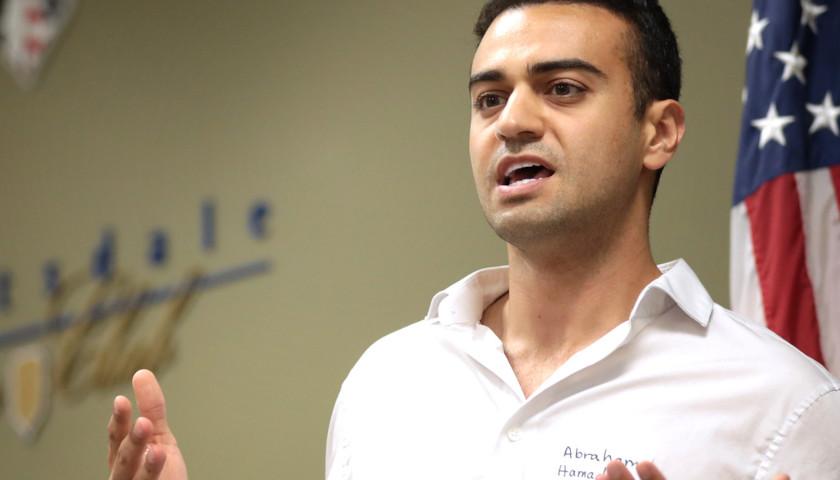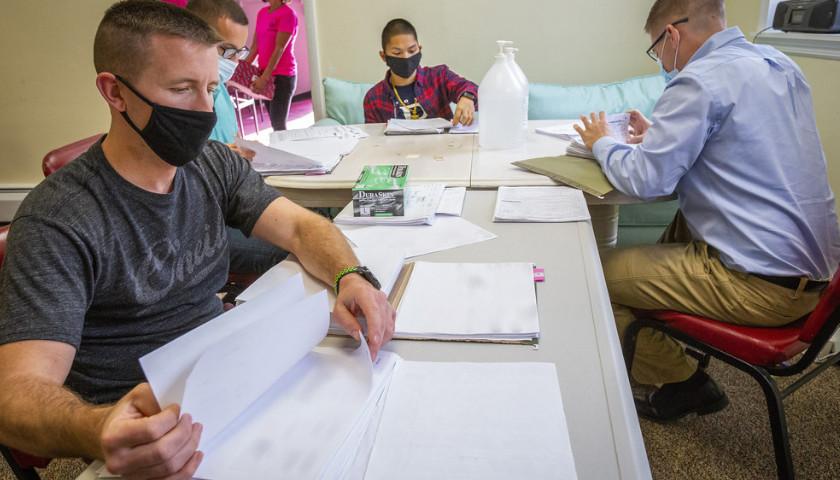Maricopa County Superior Court Judge Susanna Pineda, who was appointed to the bench by Democratic Governor Janet Napolitano, granted a Motions to Dismiss filed by Arizona election officials in response to Abe Hamadeh’s Petition for Writ of Quo Warranto. She also suggested she would award sanctions against Hamadeh, other plaintiffs, and their attorney. Hamadeh had asked to remove Attorney General Kris Mayes from office and fix the 2022 election problems, including up to redoing it.
Ryan Heath, Hamadeh’s attorney, told The Arizona Sun Times, “I worked in judicial chambers as an intern in law school. Before this ruling, I’d never seen a case where a judge blatantly ignores arguments and allegations in order to impose sanctions. The appeal is already drafted, and I’m looking forward to overturning the trial court’s ruling on appeal.”
In her 13-page opinion filed on April 1, Pineda consolidated responding to another similar lawsuit that was brought requesting a Writ of Quo Warranto by Cochise County Supervisor Tom Crosby and plaintiff David Mast. Crosby is being prosecuted by Mayes for delaying canvassing of the 2022 election due to irregularities.
Pineda ruled that Crosby and Mast lacked standing in their lawsuit, CV2023-053465. “To the extent they allege that the election procedures in question denied them equal protection due to their votes, as well as the votes of every other Arizona voter, being ‘diluted,’ their claim is general and insufficient to confer standing to bring suit,” she said. Pineda claimed that they hadn’t shown an injury, since they didn’t show or allege that their votes weren’t counted.
However, in multiple lawsuits filed over the 2020 election results, judges have ruled that far less was required for standing. In a pair of similar cases, District Court Judge Ian K. Thornhill ruled that the Republican National Committee, National Republican Senatorial Committee, National Republican Congressional Committee, and Donald Trump’s campaign committee had standing suing a county election official.
In RNC v. Weipert, Thornhill stated that the defendants argued that the plaintiffs had no standing since their “claims are based solely on the allegations that the prepopulated ABRs may lead to voter fraud in Johnson County and may ‘dilute’ the votes of Iowans living outside Johnson County,” and “the alleged injuries are purely hypothetical and conjectural.”
Thornhill said the plaintiffs’ general interest in the election was enough on its own to justify standing and risk of injury. “The Court concludes that, as entities with involvement and interests in the outcome of the November, 2020 general election, including with respect to voter registration and mobilization and having representatives of their political party on the ballot, Plaintiffs have shown a likelihood of being found to have a specific personal or legal interest in this litigation, and shown a likelihood of being injuriously affected,” he said.
In RNC v. Gill, Thornhill said regarding the same plaintiffs suing a county election official, “The Plaintiffs clearly have an interest in the manner in which absentee ballots are handled far beyond the interests of a regular citizen. The Plaintiffs have a direct interest in seeking that a uniform election system is in place and that established election rules and laws are complied with.” He cited case law, Godfrey v. State, “The injury involved need not be economic and can include conservational and other intangible interests.”
Crosby is not just a “regular citizen,” but a county supervisor who oversees elections and is on the ballot himself every four years. Pineda didn’t address any of Crosby’s and Mast’s claims, but dismissed the lawsuit completely on standing.
Addressing Hamadeh’s lawsuit CV2023-054988, filed on December 28, 2023, Pineda said that because it was brought “untimely,” challenging an election process after the election, it was barred. She cited a press release issued by Maricopa County officials on May 1, 2022, which stated that ballot envelope affidavit signatures on mail-in ballots will be compared to various previous signatures from the voter.
This press release was counter to state law, which states that signatures must be compared to the original signature when the voter registered to vote, not later signatures on mail-in ballots which didn’t require photo ID. Hamadeh cited a recent court decision which held that. In Arizona Free Enterprise Club v. Fontes, Yavapai Superior Court Judge John Napper stated that A.R.S. §16-550(A) requires this, and pointed out that new revisions to the state’s Election Procedures Manual contradicted it.
The discrepancy was not discovered until after the election, when election workers were seen flipping through screens of signature comparisons, appearing to compare signatures in as little as one second.
Pineda ruled that “challenges concerning alleged procedural violations of the election process must be brought prior to the actual election.” In his filings, Hamadeh said it was a constitutional claim, and his “constitutional rights regarding the fairness, purity, and legitimacy of elections” outweigh the time constraints of state statutes, citing case law.
Pineda didn’t explain why Hamadeh was required to have noticed on May 1 a press release that said towards the end that the county was going to subtly change one procedure. There has been ongoing litigation in other election related lawsuits including those brought by Kari Lake over that change during the election.
Pineda said a Writ of Mandamus is only available “when there is [no] plain, adequate and speedy remedy at law.” Hamadeh could have filed “a timely suit challenging the process prior to the election” she claimed.
Pineda added that “mandamus will lie only where two conditions are present; first the act, performance of which is sought to be compelled, must be a ministerial act which law specially imposes as duty resulting from office or, if discretionary, it must clearly appear that officer had acted arbitrarily or unjustly and in abuse of discretion; and second, there must be no other plain, speedy and adequate remedy at law. … Mandamus is not available when the claim is that a defendant erred in performing their statutory duty, including misapplying or misinterpreting the law.”
She said Hamadeh asserted that officials “misapplied” the law, not that they failed to follow it, but she didn’t explain the difference.
As for the Writ of Quo Warranto, Pineda acknowledged that it “may be brought by a person claiming title to an office.” She only offered a few sentences to dismiss this, without addressing the evidence listed in Hamadeh’s complaint. “He surmises, without proof, that he received the most ‘legal votes’ for the office of Attorney General,” she said. “This is insufficient to obtain the relief sought.”
Pineda asserted without explanation, “Quo Warranto does not provide for the relief sought by Petitioner.” A.R.S. 12-2044(A) states that if prevailing, the plaintiff shall be placed in that office, and may “recover the damages which he has sustained by reason of the usurpation of the office by defendant.” It does not state what the damages are.
She asserted that since Hamadeh filed two other election related lawsuits, that he can’t bring this one, known as barred by the doctrines of res judicata and collateral estoppel. She didn’t explain how the two other lawsuits were exactly the same.
Pineda said the defendants can seek sanctions against Hamadeh and his attorneys, and denied Hamadeh’s request for sanctions against the defendants. She said, “Hamadeh and his counsel filed this case ‘without substantial justification.’ Under A.R.S. § 12-349, sanctions are appropriate.”
This is contrary to a newer ruling from the Arizona Supreme Court, which issued a sweeping decision on May 2 denouncing sanctions against plaintiffs and attorneys who bring election related lawsuits. The state’s highest court said there is some merit to election lawsuits, even if a “long shot,” and ruling against them for questioning an “election’s legitimacy” would have a “chilling effect.”
Shortly afterwards, the defendants asked for over $50,000 in sanctions, which Pineda has not ruled on yet.
– – –
Rachel Alexander is a reporter at The Arizona Sun Times and The Star News Network. Follow Rachel on Twitter / X. Email tips to [email protected].
Photo “Abe Hamadeh” by Gage Skidmore CC2.0.





